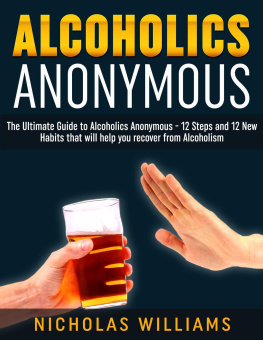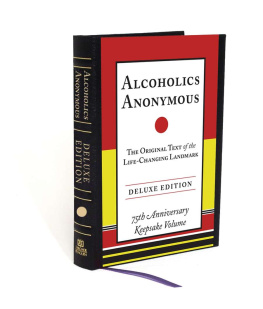Cover

| title | : | The 7 Points of Alcoholics Anonymous |
| author | : | Walker, Richmond. |
| publisher | : | Hazelden Publishing |
| isbn10 | asin | : | 0934125163 |
| print isbn13 | : | 9780934125161 |
| ebook isbn13 | : | 9780585382241 |
| language | : | English |
| subject | Alcoholics--Rehabilitation, Alcoholics Anonymous, Alcoholism--Psychological aspects. |
| publication date | : | 1989 |
| lcc | : | HV5278.W35 1989eb |
| ddc | : | 362.29/286 |
| subject | : | Alcoholics--Rehabilitation, Alcoholics Anonymous, Alcoholism--Psychological aspects. |
Page i

Page ii
This Revised Edition
Copyright 1989 by Glen Abbey Books, Inc.
All Rights Reserved
Published by Glen Abbey Books, Inc.
Printed and bound in the United States of America
Cover design by Michelle Ogata, WESDESIGN, Seattle, Washington
Library of Congress Cataloging-in-Publication Data
Walker, Richmond.
The 7 points of Alcoholics Anonymous.
1. AlcoholicsRehabilitation. 2. Alcoholics Anonymous. 3.
Alcoholismpsychological aspects.
I. Title II. Title: Seven points of Alcoholics Anonymous.
| HV5278.W35 1989 | 362.29286 | 89-16801 |
ISBN: 0-934125-16-3
Disclaimer: The publication of this volume does not imply affiliation with nor
approval or endorsement from Alcoholics Anonymous World Services, Inc.
Page iii
CONTENTS
FOREWORD |
INTRODUCTION | |
1. ADMISSION | |
2. FELLOWSHIP | |
3. SURRENDER | |
4. INVENTORY | |
5. RESTITUTION | |
6. LIVE TODAY | |
7. SERVICE | |
STEPS & TRADITIONS | |
Page iv
Page v
FOREWORD
Richmond Walker, author of For Drunks Only and the daily meditation book Twenty-Four Hours a Day , wrote this, his last book, in 1956. The 7 Points of Alcoholics Anonymous summarizes his years of experience and insight into the philosophy of the 12 Step way of life.
In the introduction, Walker outlines the basic concepts and history of A.A. The chapters that follow deal with the 12 Steps under the headings of: Admission, Fellowship, Surrender, Inventory, Restitution, Live Today and Service.
Walker believed that the A.A. Program was best realized when members share with each other and are involved in A.A. service work. His own life was an example of this belief.
We hope that The 7 Points of Alcoholics Anonymous will help those on their journey in recovery, and we are proud to make this important book available again.
Bill Pittman
Page vi
Page 1
INTRODUCTION
What A.A. Is
Alcoholics Anonymous is a fellowship of men and women who have banded together in groups all over this country and the world, to solve their common problem of alcoholism and to help others to do so. The only requirement for admission is an honest desire to stop drinking. There are no dues or fees, nor does A.A. accept outside contributions. A.A. pays its own way. Contributions from its members are entirely voluntary. The hat is passed around at meetings for money to pay expenses, but there is no obligation to chip in.
The members of Alcoholics Anonymous preserve the anonymity outside of A.A. and never discuss members names with non-members. Our names should never appear in print, although this has happened in some instances. At A.A. open meetings, when non-alcoholics are present, only the first names of the members are used.
Alcoholics Anonymous is not an organization. It has no officers or people in authority. It is simply a fellowship of men and women who have a common problem and seek a common solution. Its leaders are volunteers and are responsible to those they serve. All work done in A.A., except for a few paid secretaries at central offices, is purely voluntary. Except for a few office workers, no one ever profits financially from any A.A. work they do.
The A.A. program consists of twelve suggested steps, which the newcomer is encouraged to take in order to achieve a happy and contented sobriety. The program is a
Page 2
spiritual one. We believe in a Power greater than ourselves, which can help us to stay sober. Most of us call this Higher Power God, but each member has their own conception of God. Religion, as such, does not enter into our program.
Each A.A. group is autonomous, managing its own affairs as it sees fit, provided it follows the traditions of A.A. with regard to financial matters, anonymity, and relations with the public.
The Twelve Steps and the Twelve Traditions are printed at the end of this book. We in Alcoholics Anonymous believe that only an alcoholic fully understands another alcoholic. Our program is based on fellowship, faith, and service to others.
Members of A.A. do not accept the premise held by many persons who lack understanding of their problem that it is sinful to drink in an uncontrolled manner. Alcoholics are helped by A.A. to understand that uncontrolled drinking is the most obvious symptom of the illness called alcoholism. Thus the burden of oppressive feelings of guilt is lifted and alcoholics can gather all their strength for the task of arresting the progress of the illness.
Illness can be the result of sin, but it is not of itself sinful. Some alcoholics may have been great sinners, but other alcoholics may have led exemplary lives. With all alcoholics, the course of drinking has resulted in the fastening of the illness of alcoholism on themselves. Most of them have been as little guilty of sin as are persons who are diabetics. Both of these are victims of an illness which can be arrested by the proper treatment, but never cured.
The A.A. program is a method of arresting the illness
Page 3
of alcoholism. It is available to all drinkers, not only to great drunkards or great sinners. Few of us in A.A. have earned a place in either of the latter categories. A.A. offers hope to the people who have recognized their inability to control their drinking, before the illness has worked complete havoc with their lives, or even after this has occurred. Here are some common misconceptions about A.A.:
Because many misconceptions of our program do exist, I believe that an occasional explanation is in orderto the casual observer, to the visitor, to the new member, and sometimes to the regular members.
First , because of the common outward problem that brings us together and also because of the name of the movement, a frequent misconception on the part of the general public is that A.A. members were all, at one time, hopeless drunks, devoid of character, will, position or morals. If this is your belief, then I suggest that you study further.
Next page







